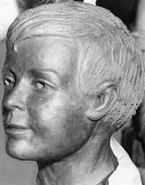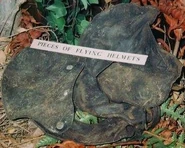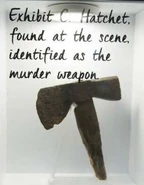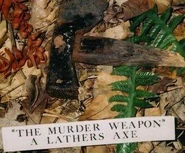(This test occurred years ago; updating wording) Tag: Visual edit |
No edit summary Tag: Source edit |
||
| Line 1: | Line 1: | ||
{{UID_Infobox|title1=Babes in the Woods {{featured case}}|image1=Babes_in_the_Woods_(Stanley_Park).png|caption1=|discovered=January 15, 1953|span={{age|1953|01|14}}|sex={{M}}|location=Vancouver, |
{{UID_Infobox|title1=Babes in the Woods {{featured case}}|image1=Babes_in_the_Woods_(Stanley_Park).png|caption1=|discovered=January 15, 1953|span={{age|1953|01|14}}|sex={{M}}|location=Vancouver, |
||
| − | British Columbia|age=6-10 years|race={{White}}|condition={{sk}}|weight=|pmi=3-9 years|cod={{Homicide}}|height=}}The '''Babes in the Wood '''are two children found in January 1953. Their skeletal remains were located deep within Stanley Park in downtown Vancouver, British Columbia. According to DNA analysis, they were both male, and brothers. |
+ | British Columbia|age=6-10 years|race={{White}}|condition={{sk}}|weight=|pmi=3-9 years|cod={{Homicide}}|height=}}The '''Babes in the Wood '''are two children found in January 1953. Their skeletal remains were located deep within Stanley Park in downtown Vancouver, British Columbia. According to DNA analysis, they were both male, and brothers, contrary to an earlier belief that the pair consisted of a male and female. It was announced in May 2021 that the Redgrave Research Forensic Services were contacted to assist with genetic genealogy in hopes to discover their identities. |
| − | |||
| − | |||
| − | |||
== Case == |
== Case == |
||
The remains were found by a park gardener named Albert Tong in a brush-filled area of the park near Beaver Lake. The bodies were lying in a straight line with their feet close together and their heads in opposite directions. They had been covered by the remains of a woman's oilskin coat. |
The remains were found by a park gardener named Albert Tong in a brush-filled area of the park near Beaver Lake. The bodies were lying in a straight line with their feet close together and their heads in opposite directions. They had been covered by the remains of a woman's oilskin coat. |
||
Revision as of 03:53, 22 May 2021
The Babes in the Wood are two children found in January 1953. Their skeletal remains were located deep within Stanley Park in downtown Vancouver, British Columbia. According to DNA analysis, they were both male, and brothers, contrary to an earlier belief that the pair consisted of a male and female. It was announced in May 2021 that the Redgrave Research Forensic Services were contacted to assist with genetic genealogy in hopes to discover their identities.
Case
The remains were found by a park gardener named Albert Tong in a brush-filled area of the park near Beaver Lake. The bodies were lying in a straight line with their feet close together and their heads in opposite directions. They had been covered by the remains of a woman's oilskin coat.
At the scene they found:
- A leather aviation helmet with goggles, still attached to the skull of the smaller child.
- What was left of their clothing; a child's belt, a zipper from a sweater or jacket, and two pairs of brown Oxford shoes with white rubber soles.
- A plate bracelet depicting two dogs and a sitting rabbit(?) in the middle, belonging to the older child.
- A blue tin lunch box
- A small, worn, rusty roofer's hatchet, with its handle broken in two places. Marks from this hatchet were consistent with the injuries sustained to the children's' skulls, making it likely to have been the murder weapon.
- A coat with grey-green lining and tie strings around the waist, which was used to cover the bodies.
- A woman's shoe.
Investigators were certain that the two were a boy and a girl, or a boy and a young woman, based upon the clothing found at the scene. Medical examiners also mistakenly concluded that it was a boy and girl, both of different ages but under 10 years old. It was not until 1998 when the case was reopened and DNA analysis performed, that they were revealed to both be male, a fact which almost certainly hindered the original investigation and identification of the boys.
The year of their death is also uncertain. Based upon the amount of foliage at the scene, and the style of shoe that the children had been wearing (which were believed to have been imported from Asia, and not sold in Canada until after the Second World War, although this has since been proven incorrect), police placed their deaths sometime during the Fall of 1947. There is some evidence, based upon witness reports, that their deaths may have occurred in 1949/50, or as early as 1944.
In the 1980s, the remains were discovered to have been placed in an exhibit at the Vancouver Police Museum. When the case was reopened, in the 1990s, the investigator in charge took DNA samples from the boys and cremated their remains, scattering them in the water off of Kits Point. The museum now has replicas of the skulls and bones on display, along with the articles found at the scene.
Witness reports
First Witness report
A man who worked in a logging camp reported that, in 1949 or 1950, he and his friend had picked up a woman with two children. During the ride, she had told the men that she had been in trouble with the Mission Police for vagrancy (or possibly "Vag C", meaning prostitution) charges. They learned that either one or both her children had attended Cedar Valley School and that she lived on Cherry Street in Mission, B.C.
The only description available for the woman is that she had red hair. The two boys who were with her were about 6 and 7 years old and at least one wore an aviator flying helmet. Using this information, the police managed to find the family name of Grant, but this lead was exhausted after speaking to surviving family members.
Second Witness report
In May 1944, a sailor from Esquimalt and his fiancée were walking along the seawall surrounding Stanley Park when a woman crashed out of the bush in front of them, wearing just one shoe and no coat, and letting out a guttural sound. When she noticed the couple, she took off running.
This lead was discounted at the time, as it was believed that the boys would not have had that style of shoe in 1944. However, it was discovered that the shoes would have been available in Vancouver before the end of the Second World War, and it is therefore now being looked into to see if any boys had gone missing from school around that time.
Gallery
Media appearances
- The case was depicted on a 1999 episode of Cold Case Files.







